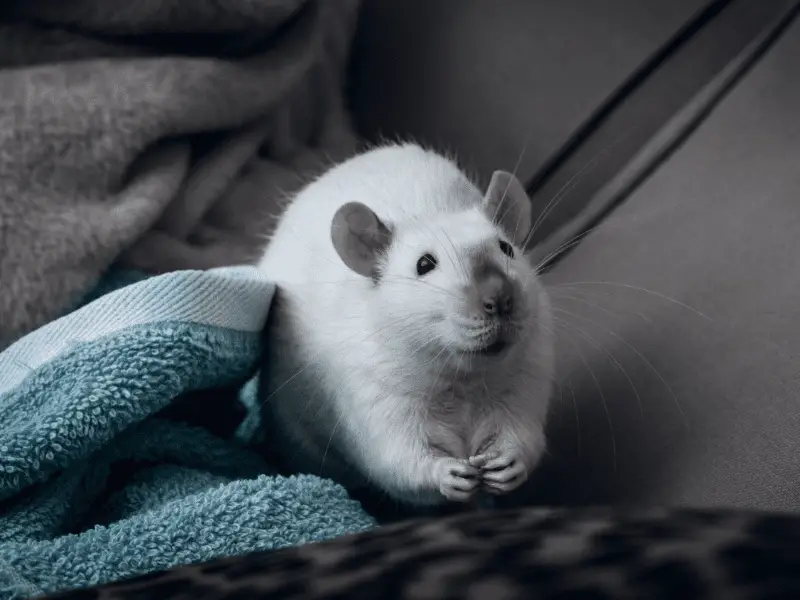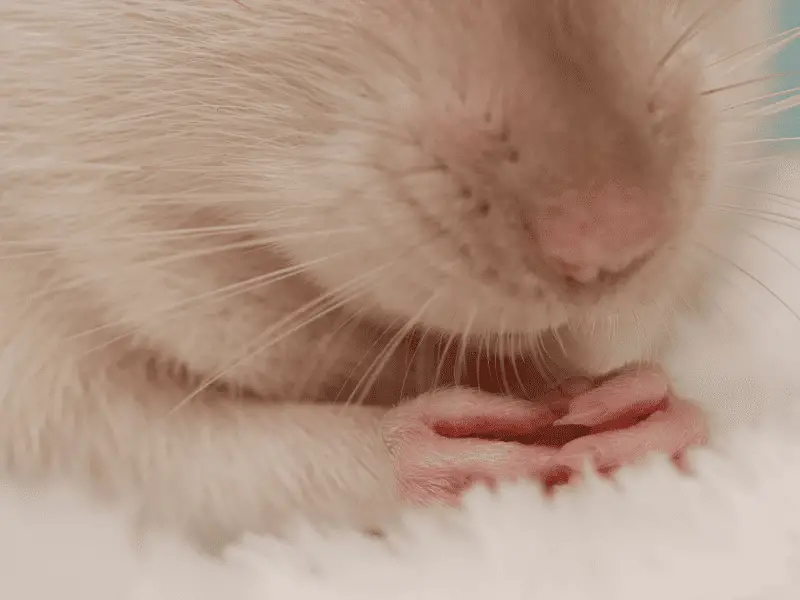Many rat owners will, unfortunately, experience this at some point. This is due to rats’ life expectancy (around two years) being so much shorter than humans’ and because they are notorious for hiding signs of injury or illness.
Rats are prey animals, and showing signs of illness will make them an easy target for predators. For this reason, rat owners often have no idea that there may be an underlying condition brewing until it may be too late.
If you find that your rat has suddenly passed, please don’t feel alone and don’t blame yourself. Instead, this article aims to help you navigate this extremely stressful time.

Reasons for Sudden Death In Pet Rats
New, Young, or Frail Rats
If you recently obtained a new rat from a breeder or pet store and come to find that they have passed shortly after, the chances are that they had an underlying illness such as a respiratory tract infection or high parasite load. The stress of suddenly being introduced to a new environment can suppress their immune system, which will cause sudden and severe progression of underlying conditions.
Internal parasites can be fatal in frail rats, often very young or much older. Again, a weakened immune system can lead to death with minimal to no symptoms.
In older rats, general health decline may also lead to a poorer capacity to deal with stress. In many cases, the slow onset of chronic disease can be hidden by the rat’s decline in activity level and appetite due to aging until normal body function can no longer be maintained, resulting in what seems like sudden and unexpected death.
Respiratory Conditions
Respiratory disease is relatively common in pet store rats, as they are often kept in poorly ventilated enclosures. This leads to a build-up of ammonia and respiratory tract irritation which creates a hospitable situation for bacteria and viruses to cause respiratory infections.
In some cases, respiratory disease may be brewing in the apparent absence of apparent symptoms. More commonly, though, rat owners will notice faster than normal breathing, discharge from the eyes or nose, and sneezing.
As a side note: If you would like to read more on which symptoms to look out for to know when to take your rat to the vet, have a look at this article. Also, have a look at this article on how to do a general health check at home to be able to check your rat’s vital signs at home.
Pituitary Tumors
Pituitary tumors are among the most common cancers that pet rats suffer from. Unfortunately, we often have no idea that a rat has a pituitary tumor until the tumor becomes rather large and starts to interfere with the surrounding tissues at the base of the brain where it is located.
These types of tumors can lead to sudden death in rare cases when the walls of large blood vessels become eroded due to the rapid growth of the tumor, leading to sudden bleeding in the brain- if the bleeding is severe, this can lead to sudden death with nearly no symptoms apart from perhaps extreme lethargy for a minute or two before dying.
Heart Conditions
Heart conditions often go undiagnosed in rats because it is challenging to pick up on. Their extremely high heart rates make it challenging to auscultate abnormalities using a stethoscope.
Sudden malfunctioning of the heart’s electrical impulses can lead to non-productive heartbeats, resulting in oxygen deprivation of the vital organs and quick death.
Tumor or Cancer
Rats are genetically prone to tumors, and not all tumors are visible externally. Tumors growing on internal organs often have no external symptoms until the tumor is large and starts interfering with the normal functioning of internal organs (similar to a pituitary tumor discussed above).
If you would like to read more on how to care for a rat with a tumor and whether it is painful, feel free to click on the respective links for a better explanation of these topics.
Internal Injury
Rats love to climb up the sides of their cage and roughhouse with their cage mates. Unfortunately, this can sometimes cause them to fall from a height, leading to injuries that are not always visible externally. An example of such an injury that may lead to sudden death is steatitis or internal bleeding, for instance, following a rupture or injury of the spleen.
Steatitis is the inflammation and sometimes infection of fat, often due to physical trauma such as falling from a height. The uncontrolled inflammation of fatty tissue can eventually lead to shock or septicemia, of which the symptoms may go unnoticed.
Is My Rat Really Dead?
You may feel helpless when you find your beloved rat collapsed and unresponsive. If at that time you are unsure whether they have passed, you can look for the following signs:
The signs of death include the following in order of occurrence in most but not all cases.
- Cessation of breathing
- Dilated pupils
- Absence of pulse (heartbeat)
- Blue or grey tongue and gums
- Tightening of muscles
- Decreased body temperature (in rats that have been ill for a while, this may be one of the first signs)
Other Signs You Might See After Your Rat Passed Away
Agonal Breaths
This refers to the last breath, often seen as a gasp. In some cases, there may be a few agonal breaths. The rat has already lost consciousness at this point. Due to the lowering of blood oxygen levels signals the autonomic nervous system to take a breath, causing the body to use the last ”energy” in the muscles to gasp.
This may look frightening, and it is no fun to witness, but be comforted that your rat can not feel anything at this stage due to brain oxygen depletion leading to unconsciousness long before this point.
Leaking Of Fluid From Body Cavities
It is common for all animals to urinate or defecate shortly after death as all muscles relax. There may be fluid draining from the mouth and nose as well.
Depending on the cause of death, the fluid may appear blood-tinged. Do not be alarmed at this. The leaking of fluid and the appearance of the liquid does not necessarily indicate a prolonged or painful death.
Rigor-Mortis
Rigor-mortis refers to the tightening of muscles after death. This can start 10 minutes after death and is complete by 6-8 hours. It will be nearly impossible to bend joints or adjust the body’s position at this point. The muscles will relax again around 24-48 hours if the body is kept at room temperature.
Malodor
You may notice a foul odor around the 12-hour mark if you have a sensitive nose. The peak of smelliness is around days 2-4, and the smell will start to subside around two weeks.
Why Was My Rat In An Odd Position When I Found Him After He Passed?
When a rat or any animal dies, the muscles are depleted of oxygen, resulting in a cessation of energy production by cellular metabolism.
There will, however, still be energy present in the muscle cells and potential (signals running along nerves) in the nerves. This can lead to the contraction or tremoring of muscles within the first few minutes after death. However, this usually only lasts a few minutes and may result in the body pulling into an awkward position.
This is commonly either a curled up position with the head tucked under or an arched position with the head extending upward.
There is no correlation between the position after death and the cause of death, as this is mainly determined by the amount of energy and potential in different muscle groups and nerves at the time of death.
If you find your rat in a strange position, it does not indicate a painful death or death due to suffocation. It is simply the result of the physiological process of death whereby energy in nerves and muscles are ”used up”.
What Are The Options To Have Cause of Death Investigated?
If you want to know the cause of death to have closure or investigate possible causes of death that may be a risk to other rats, a post-mortem (necropsy) can be performed. Some vet clinics and veterinary universities offer this service.
Speak to your local vet about your options. If they do not offer the service, they should be able to point you to someone who can.
If you desire a post-mortem, it is ideal to get the body to the lab as soon as possible, as normal post-mortal changes can obscure the findings.
If you cannot deliver the body to the lab immediately, place it inside a waterproof plastic bag (preferably two to prevent accidental leaking of body fluid) and keep it somewhere cool, preferably a fridge, to delay post-mortal changes that will interfere with the findings of the post mortem.
In some cases, a post-mortal investigation can provide valuable information about the cause of death, but not all post-mortems provide exact and definite answers. In addition, some causes of death can be complicated to determine unless advanced and often costly diagnostic tests or imaging are pursued.
What Is The Best Way to Handle The Body?
The first thing you need to do is remove the body from the enclosure to prevent the other rats from trying to ”clean up”. It is the instinct of rats to destroy all evidence of death to avoid attracting predators, so you really can blame them.
If you are not in a state to be able to handle the body, ask a loved one to help you. If you are unsure whether you want a post-mortem done, you need to keep the body in the fridge, but if you are sure that this is not the case, it is best to freeze the body.
Tightly wrap it in a hand towel or small blanket, place it inside a waterproof bag, preferably two, and put it in a freezer, separate from food, until you are ready to decide what to do with the body.
Cremation
This is something that your local vet can help you with. Vets commonly use pet crematorium companies that usually collect bodies from the clinic and cremate them at a dedicated facility.
There are usually options available to have individual cremation whereby they can return the ashes of your individual pet if you wish. Usually, there are various options for returning ashes, such as a little wooden box or a candle or pot plant.
I even know some rat parents who had the ashes of a special rat made into custom jewelry.
You can try to contact a pet crematorium directly, as this may sometimes be slightly cheaper than working through your vet clinic (depending on pick-up and delivery options).
The most common and least expensive option for cremation is to have the body communally cremated, which means you will not get any ashes back.
Burial
You can also bury the body in the garden or a large pot plant. Just keep in mind that some local authorities may have laws against burial on residential properties.
Some rat owners find comfort in growing a beautiful plant in a pot where they had buried their much-loved rat.
Other Memorial Options
If you do not want to keep the body or have the ashes returned, other options include engraving name-tags or framed paw prints. Again, your local vet clinic should be able to help point you in the right direction, depending on the option you choose.
What About My Remaining Rat(s)?
Losing a cage mate can be as hard for you as it might be for your remaining rat(s). My article on how rats experience sympathy and grief is interesting and how music may help and tips to calm a stressed rat.
Rats do not do well if kept alone, so if you have only one rat remaining, you need to either rehome them or acquire a new rat or two.
If you have one rat remaining, they should be okay for a week or two by themselves as long as you provide lots of cuddles and free-roaming time to keep them occupied.
The best general advice I can give is to get two youngsters of the same sex as your remaining rat. In this case, the youngsters can keep each other busy and reduce the likelihood of bullying from the older rat.
It is important to quarantine your remaining rat(s), especially if you suspect an infectious cause of death. If you decide to get new rats, they need to be quarantined for at least a week to prevent the introduction of diseases. Thoroughly clean the cage and bedding before introducing new rats and follow a safe rat-introduction protocol to avoid fighting.
If you choose to go the rehoming route, you can browse Facebook for local rat interest groups or look for your nearest rat shelter.

Tips To Heal A Broken Rat Parent’s Heart
- Realize that it is not because you did something wrong. No matter the circumstances or cause of death, you did the best you could with the information you had and that is enough.
- Chat to someone. It is never a good idea to hoard negative emotions. Instead, talk to a friend, partner, family member, or psychologist as long as you voice your feelings after a traumatic event. There are many rat parent groups on Facebook that can also help. In addition, many rat owners have gone through this experience and understand the turmoil you are experiencing and will offer words of advice and comfort.
- Remember the good times. Remembering all the happy times or funny things your rat did can be incredibly healing. Look at old photos and share some of your happy memories of your rat with your close friends or family or fellow rat enthusiasts.
- Cry a little, or a lot – do what you need to do. They were more than just another rat, and nothing could replace the void that they left.
- Give yourself time. After losing a beloved pet, it is normal to mourn for some time. Be patient and kind to yourself. It might not feel that way right now, but the horrible feeling you are experiencing will pass with time.
No matter the circumstances or cause of death, you did the best you could with the information you had and that is enough.
Be patient and kind to yourself. It might not feel that way right now, but the horrible feeling you are experiencing now, will pass with time.
